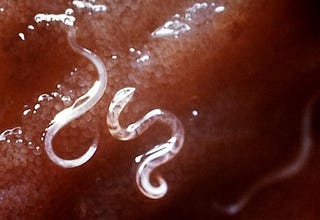Buffalo live a long time, and they live together in big social groups. This makes them surprisingly good models for human diseases. When researchers treated one malady in buffalo, they discovered a surprising downside — they made them worse, but in a totally different way.
Helminths are unpleasant little worms that live in mammalian hosts. They can live all sorts of places, including blood vessels, but they generally hang out in the intestines. To survive in a hostile environment, helminths suppress the body's immune system. They do so effectively enough that they are sometimes considered medicinal — people who suffer from ulcerative colitis, a condition in which the immune system turns against the body, have found relief by consuming worm eggs, and allowing the helminths to dampen their immune response. (It's worth noting that they got the eggs from a doctor, not online.)
Worms wriggling around the intestines can be helpful for someone with an autoimmune disease, but they're dangerous for someone with tuberculosis. The helminths suppress specific immune responses to the tuberculosis bacteria. So fighting off helminths is a clear way to suppress the spread of tuberculosis, right?
Unfortunately not. Researchers tested the theory on populations of African buffalo. Buffalo live in herds, and generally have long lives, making them good models for human behavior. Like humans they suffer from intestinal parasites and tuberculosis. Researchers began treating one herd for helminths, leaving another herd untreated. Over four years, they monitored disease in both herds.
Tuberculosis spread far faster and wider in the treated herd than the untreated one, for a depressing reason. A living animals spreads tuberculosis faster than a dead one. Infected buffalo who lived longer spent their days spreading tuberculosis to other animals in the herd, resulting a thoroughly infected population.
This does not bode well for humans. It is, however, good information. It lets us know that in order to treat diseases, we need to figure out a way to ameliorate the suffering of individuals without putting populations at risk. Any ideas?


0 comments:
Post a Comment